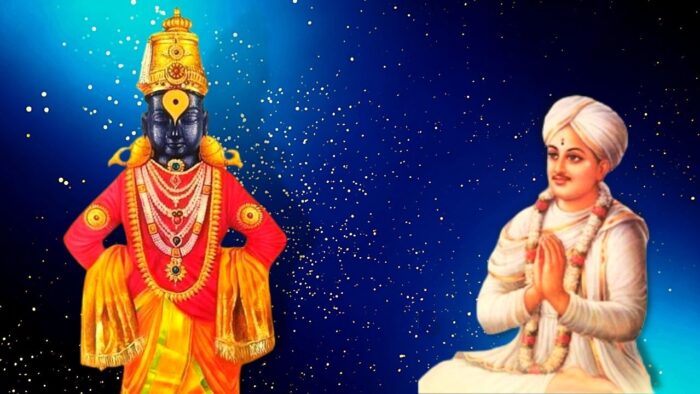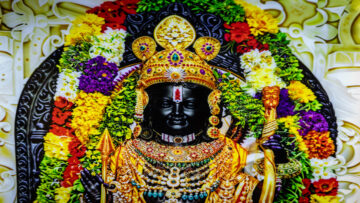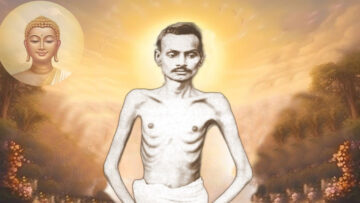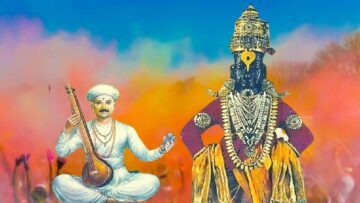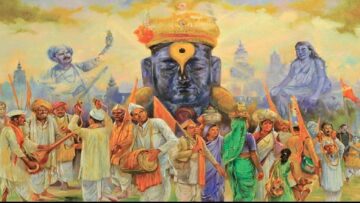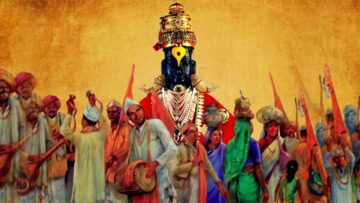Bhanudasache kulli Maha Vishnucha Avatar
Kshetra Pratisthan nande Godavari teera
(In the lineage of Bhanudas was born the avatar of MahaVishnu
He lived in holy Paithan on the banks of the Godavari)
Shantibrahma Nath Eknath Shashthi is observed on the sixth day of the Krishna Paksha (waning phase of the moon) of the Phalgun month. This is the day when Sant Eknath Maharaj chose to take jal samadhi.
Eknath Maharaj is one of the most revered Warkari sants of Maharashtra. He lived an unparalleled life blending together beautifully the elements of paramartha and grihasti. At every step he practiced what he preached. Many tried to trap him into krodh (anger), vyasan (vice), durvyavahar (misbehavior). He faced overwhelming jealousy and calumny, but his calm never deserted him. He was the personification of shanti (calm), namrata (humility), sahanshilata (forbearance), satshilata (good character).A personage who can be called the tallest among the tall. No visheshan can be an exaggeration to describe his goodness and virtue. His gurubhakti, shraddha and guru seva are again advitiya (incomparable).
Eknath Maharaj was born in the 16th century in a family of great Sant Bhanudas Maharaj, a brahmin by birth, who was his great grandfather. Those were times of extreme unrest in Bharat. Paithan called Pratisthan then, was his hometown. It fell in Taluka Aurangabad which was the centre of great upheavals of what is referred to as the medieval ages.
His grandparents and parents too were great bhagwatbhaktas. Unfortunately his parents died when he was a child and he was brought up by his grandparents. They were loving, gentle and kind. A precocious child, he was hardly ever seen to play with other children and his leaning towards paramartha was apparent in his early childhood. He would make murtis of devas and play with them or tear a saffron cloth, tie it to a stick and carry it on his shoulders in imitation of Warkaris walking towards Pandharpur. Realizing how bright he was, his grandparents had hired a puranikbua (teacher of Purāṇas) to teach him the Purāṇa and other scriptures. Bua was kind but told Purāṇa kathas for a living. He was not prepared for the probing questions and explanations demanded by his brilliant shishya and found it increasingly difficult to handle the bright Eknatha.
One day Eknath Maharaj was taken to the village mandir by his grandparents to listen to a Purāṇa katha. The puranik bua described with great fervour the importance of a guru in one’s life and how life is incomplete without a guru. Little Eknath hung onto every word he heard and ran to bua at the end of the katha, and with tears streaming down his eyes, asked him where he could find his guru and that he would not rest till he found him. Puranik bua was achambit (stumped)! How could he answer this little saintly child’s question? Then he remembered Swami Janardan, a great bhakta of Dattatraya and a renowned Swami and described his greatness to little Eknath with such sweetness that little Eknath desired to meet him without any delay. Swami Janardan lived in Daulatabad on the Devgiri kila (fort), a good 60 kilometers from Paithan.
Without any more thought, little Eknath left the mandir and took the road to Daulatabad, alone on foot.
Vyadha hatuni sutala vihangu jaisa
(Desperate like a bird escaping / fleeing from the clutches of a hunter)
He could not have been more than 7 years old. There were skirmishes and infighting going on all over. The area was full of bush and jungle and there was always the fear of wild animals. But this did not matter to him and after a few days of travel he finally reached the foot of the Daulatabad Kila, tired and hungry. How he reached there, what he endured along the way, whether he had had anything to eat, is not known. There he was stopped by two tall and hefty Pathan guards. They asked him where he had come from and what he wanted. He told them that he wanted to meet Swami Janardan. They looked at this charming bal murti, so tired and dishevelled, but with so much faith and hope on his face, that their hearts melted. They informed him that people were granted an audience with Swami Janardan only on Thursdays, which was a few days away. Seeing his woebegone face they comforted him and asked him to return on Thursday. But where was he to go? His home was far away. The Pathans then shared their food with him and little Eknath slept on a log nearby. Days passed in this manner and Thursday dawned. Bal Eknath was ready and waiting at the crack of dawn. The minute the gates were opened, he ran up the steps. Swamiji was sitting on an asana (pedestal) in a huge hall which was full of people in need. Each one had come there to ask for something or the other. Swamiji was giving each one what they wanted. It was evening by the time the hall was emptied of people, when suddenly he saw little Eknath in the corner, waiting patiently with folded hands to be called. Seeing him Swami Janardan gestured to him, and tenderly asked him his name, where he had come from and what he wanted. Bal Eknath came near him with folded hands, and whispered ‘My name is Eknath. I want you’. Hearing these words of young Eknath, Janardan Swami was stupefied and deeply touched. He had addressed the concerns and problems of thousands of people every Thursday. Never had anyone uttered such words to him. ‘Everyone wants something from me. No one wants me’, he thought. He watched as he saw tears streaming down the face of this beautiful, unusual child and recognized instantly that this was no ordinary being. He hugged him, called for his wife and told her that little Eknath would live with them from that day onwards.
Thus started Eknath Maharaj’s journey towards the greatness he was destined to achieve.
He stayed in his guru’s house for many years thereafter, doing whatever seva that fell to his lot. He became a son to Swami Janardan and his loving wife. He would run after her and help her in the kitchen, run errands for all those living in Swamiji’s household. He would press Swamiji’s feet at night, keep accounts diligently and scores of other such duties. He learnt how to do paramartha as well as the duties of a grihasta from Swamiji.
Swamiji was a great bhakta of Dattatraya.
Janardan Pant Dnyanarashi
Dattatraya darshana hoth tyasi
(Janardan Pant was a mountain of knowledge
And he would have the darshan of Dattatraya regularly)
Eknath Maharaj was an, ashta pallu vyaktimatva (one who is multi – faceted). Once when there was a sudden attack by enemies on his Kila, Janardan Swami was dhyanasta (meditating). Young Eknath did not feel like disturbing him and valiantly led the army as Senapati to a victory. When Janardan Swami heard this he was overwhelmed and bestowed on him the jagir which he had received from the king. Thus Eknath Maharaj would never have to worry about earning a livelihood. He was now a jagirdar, which for Eknath Maharaj meant that he had the power to give generously to anyone in need.
There are innumerable and extraordinary incidents of Nath Baba’s generosity, his wisdom, kindness as a social being, as an adhyatmic guru, as a grihasti (householder). Only a few can be dealt with in this short write up.
Years went by in this way. Eknath Maharaj had grown into a young man now. He was married to a beautiful and accomplished girl Girija with great pomp by Swamiji. Having realized his greatness all along Janardan Swami felt and was advised by Shri Dattatraya that it would be wrong to keep him with them anymore. He was born for a higher cause, to serve mankind and he had to be sent back to his home town Paithan.
Young Eknath did as his guru commanded and settled down in Paithan. It was then as it is to this day a tirtha kshetra and drew great learned gurus and saints from all over – which is also why it was a place where the dharma gurus of all kinds congregated. Many sants of Maharashtra have lived or are associated with Paithan. In those times, it was the seat of orthodox dharma gurus. They were always opposed to Eknath Maharaj’s all inclusive bhakti and felt that he was challenging age old customs and traditions.
Eknath Maharaj never openly opposed them. He had inherited Vitthal bhakti from his forefathers and naturally followed the all inclusive tenets of the Warkari Sampradaya and Dnyaneshwar Maharaj and Namdeo Maharaj, born two centuries before him. This made him very popular among all and naturally enraged others.
The Warkari Sampradaya was founded by Sant Dnyaneshwar Maharaj in the 12th century to carry the great knowledge of our dharma to the masses who were vanchit (kept out) from this knowledge because it was in Sanskrit. Eknath Maharaj too wrote prolifically in Prakrit. He wrote the great Eknathi Bhagwat, Bhavartha Ramayan, Abhangs, Bharud, kolatin, Gawlan, Gondhal, etc. In this way he used all kinds of folk forms of Maharashtra to carry his message to the people. Through all these folk forms he could do prabodhanor awakening among the people. He was extremely gentle in his demeanor to all who were ranged against him, but through the various folk forms he used for his prabodhan, he has mocked them and his Sahitya (literature) is laced with rustic humour which being entertaining, easily carried his message to the masses. He openly laughed at their hypocrisy and the hollowness of their tall claims. People flocked to his rasall (sweet) Kirtans. And naturally he became the target of jealousy of conservative brahmins who zealously guarded their turfs. Eknath Maharaj was a path breaker like all other Warkari sants. His dynamic but compassionate leadership was a great support to the poor, backward and those belonging to the lower jati who did menial jobs. Like all other Warkari sants they yearned for this healing touch and he embraced them with all his heart.
He created a stir when he picked up the crying child of a Mahar (name of lowest group of the jati system ) cleaned him and carrying him to his home in the Mahar vasti (the colony where the Mahars stayed). The dharma gurus full of arrogance and false pride, were livid with him. But somehow Eknath Baba always managed to outwit them in his gentle but firm manner. He always stood for humanity and did what was right and was always ready to bear the consequences of his actions from the so-called leaders of the society.
Can it be a surprise that Vithu was all the time looking over him and protecting him?
In fact it is said that Panduranga stayed at his place as Shrikhandya and filled the raanjan (deep well) in his house. He used to be present at each of his Kirtans and would dance with great abandon when his bhajan Vithoba Rakhumai was sung.
Many a times the mischievous and jealous ones from his town would try to trap him into vice or anger. They never succeeded. In fact he always won them over by an inner calm, which never deserted him. One man who needed money for his daughter’s marriage was asked by some anti social people from Paithan to spit on Eknath Maharaj, in order to make him krodhit (angry). It is human nature to enjoy the fall of the great and good. As was usual with Eknath Maharaj he came for a dip in the holy Godavari that morning. This man lay in wait for him on a tree and spat on him 108 times. Everytime he spat, Eknath Maharaj would walk back and take another dip in the Godavari River. After he did this 108 times the miscreant was exhausted, and humbled. On the other hand, Sant Eknath displayed no tiredness but an awe inspiring calm. The miscreant fell at Maharaj’s feet and wept with pashchatap (remorse). He told him why he had behaved so and Nath Baba smiled. ‘Why didn’t you tell me this before? I would have given you the 250 Rs that you needed. But it doesn’t matter. I will be angry with you in front of them so that you may receive your reward from them too.’ He definitely was a divine being. In modern parlance, he was a highly emotionally intelligent person.
The manner in which he found solutions for any problem – domestic or social, sets him apart from most ordinary mortals. He had three children, one son and two daughters. One of his daughters was married in Paithan and she was distraught because her husband used to regularly visit a kolatin (female singer). Girijadevi quietly asked him to solve this marital problem of their beloved daughter. Without a second thought, not worrying about his pratishtha (high standing in society ) he went to the kolatin’s house and asked her to sing for him – all this for the sake of his daughter. He visited her many times and finally she became his devotee. She promised him that henceforth she would only sing abhangs of Panduranga. In this way his son-in-law too stopped visiting her and he succeeded in solving his daughter’s marital problem. The moral courage he displayed here is one more reason to revere him.
Not only did Nath Maharaj face opposition for his kind of paramartha from the orthodox, but also from his only son. This must have been difficult to bear. But once again Nath Baba did not lose his equanimity.
In the second adhyay (chapter) of the Dnyaneshwari, when Dnyaneshwar Maharaj describes the qualities of asthitapradnya (steady mind) to Arjun he says,
Dekhe akhandit prasannata, athi jeth chitta
Tethe rigne nahi samasta, sansaar dukkha
(Worldly sorrow can never enter the heart
of one who has joy in his heart)
This ovi (couplet) perhaps applies to Eknath Maharaj more than anyone else. His son Haripandit was truly a pandit or scholar. He knew all the ancient scriptures by heart. Eknath Maharaj never allowed his ego to distance himself from his son. Over a period of time he proved to him how wrong he was. Once Haripandit left home for Kashi in a huff. He could not bear the way his father practiced adhyatma. He hated the way people of the lower jati were fed in their home. Eknath Maharaj consulted his wife and asked her to accompany him to Kashi to cajole him to return home. Girijadevi was not in favor of this. She resented the fact that he did not revere his father the way he should. But Eknath Maharaj persuaded her. They went to Kashi where Maharaj promised Haripandit that henceforth he would not perform his Kirtans but learn from him, much to the utter chagrin of Girijadevi. They returned home and as decided Eknath Maharaj stopped all his Kirtans and in his place Haripandit would expound the shastras. The people of Paithan were watching from the sidelines this skirmish between father and son. They flocked in curiosity to hear what Haripandit had to say and they also came out of the deep love and respect that they had for his father. But soon they realised that Haripandit like many other scholars of his ilk was learned but dry, lacked empathy and was full of pride in his knowledge. He was only parroting the scriptures and showing off his knowledge, but there was no application of what he had learnt. Used to his father’s bhakti rasa filled Kirtans and naam smaran which even Dattatraya and Panduranga loved, they found nothing to draw them towards his discourses. They did not elevate them nor did they make them feel better or improve their lives in any way. Dnyaneshwar Maharaj says,
Dnyanachi kari andhare dnyanasi ga
(It is knowledge only which blinds itself)
In other words, the irony is that when knowledge is accompanied by false pride and arrogance, this knowledge itself blinds you.
A day came when Haripandit was sitting on the vyasapeeth (podium) and he had only one shrota (audience) who was his father. Eknath Maharaj though pained as a father, knew that this was the only medicine that would work to put him on the right path. When Haripandit saw the mandir hall empty except for the two of them, his false pride fell away. He fell at his father’s feet crying and asking for forgiveness. His father hugged him and consoled him, thanking Panduranga for always being there for him.
Then one day like all divine beings Eknath Maharaj decided to end his avatar karya. He declared that he was going to take samadhi. All great souls decide when they wish to leave this world. There was a young man named Gavba who had lived with Maharaj since he was a little boy. His poor mother could not feed him puranpoli (a Maharashtrian sweet made of jaggery and wheat) which he desired every day. On learning of this, Eknath Maharaj took him into his home and saw to it that he would be fed puran poli everyday. In return Gavba who had become a wrestler, would beat up anyone who spoke against his Nath Baba. He called Gavba to him and told him that he was leaving this world and that he had made arrangements to see that he was served puran poli for the rest of his life. Gavba started weeping. Nath Baba consoled him and asked him for a favor. Gavba would have gladly given his life for his beloved Natha Baba. ‘I want you to complete the Bhavartha Ramayan that I’m writing’, said Nath Baba. Whatever Gavba had expected it certainly wasn’t this. He stood gaping at Nath Baba in bewilderment. ‘I am illiterate and know nothing. How do you expect me to do this for you? Are you making fun of me Baba?’
Nath Baba then called him closer and commanded, ‘Open your mouth and stick your tongue out.’ Gavba obeyed. He wrote RAM on his tongue and blessed him. ‘Only one who is pure and empty of any worldly learning will complete what I have left unfinished’.he declared and walked into the Godavari to take jal samadhi. Well over eighty years of age, he had by then, lived a long, fulfilling life. His avatar karya was over and he felt that it was time for him to leave happily, with deep contentment in his heart.
Gavba wrote the rest of the Ramayan and it is no different from what Eknath Maharaj would have written.
Such is the Mahima of an avatari purush. Even in his going he saw to it that he comforted and left everyone happy. His huge body of work and his message lives on for over 500 years and shall continue to do so forever.
Disclaimer: The opinions expressed in this article belong to the author. Indic Today is neither responsible nor liable for the accuracy, completeness, suitability, or validity of any information in the article.

